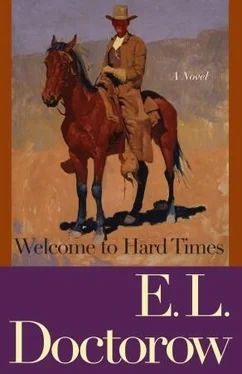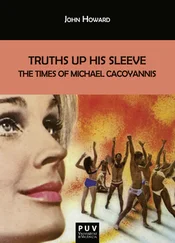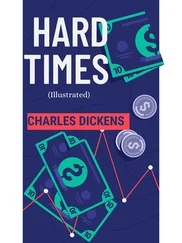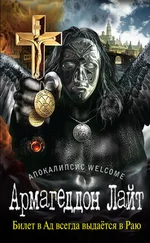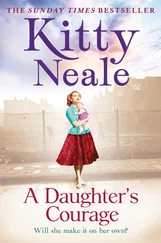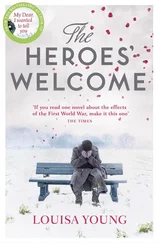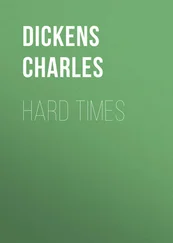By the new year the street ran from my cabin, which was its southernmost end, in a crescent that found itself once more at John Bear’s shack at the foot of the trail leading up to the lodes. It was a full year, and half again another, since the day I put spade to earth for a dugout.
Molly said: “All these fools have come like buzzards after the smell of meat.”
“Buzzards eat what’s dead, Molly. This town is alive.”
“Nobody talks. They’re all keeping an eye out.”
“They’re waiting for the spring, Molly.” Why did I need to tell her so? “Everyone stands to make a little money comes the warm weather.”
“Jimmy?” she called.
We were by the front of our door in the dark of late afternoon. There was a crust of snow on the ground. Up the street there were lights shining from the windows. In the sharp, cold air, you could smell suppers cooking.
“Molly,” I turned to her, “what’s worrying you? We are alright, can’t you see that? We are prospering.”
Just then Jimmy jumped out of the shadows where we hadn’t been looking for him. He put his hands over Molly’s eyes: “Hoo!” he said in her ear.
She started. Then she pulled him around to her and held him tight: “Oh Mayor,” she said, “if this town stretched four ways as far as the eye could see, it would still be a wilderness!”
The boy’s trick had startled me too. And for one chilling moment I knew what Molly meant. A shudder ran down my back. But then the true sight of our town returned to me, and once more Molly and I were looking at the same scene but with different eyes. I had to smile how like a woman it was to scare in the good times.
That was only last winter but it seems like ancient days in my mind.
I have been trying to write what happened but it is hard, wishful work. Time is beginning to run out on me, and the form remembrance puts on things is making its own time and guiding my pen in ways I don’t trust. In my mind’s eye is an arch of suns multiplying the sky — or a long flickering night of one moon turning over and over into its shadows. I know this is trickery but I can’t blot it out. I think Molly, Molly, Molly and she is the time, turning in her phases like that moon, smiling and frowning while the boy grows big, setting down in frame like Fee his father … And I see something that never happened, the two of them carrying a giant cross with great effort, planting it over Fee. “I ain’t much for God,” he protests, “I always put my faith in people.”
Molly, could you really know what was coming? Or did it come because you knew it? Were you smarter than the life, or did the life depend on you?
There was a sign they put up when the weather grew warm. Isaac provided a bolt of muslin and Zar bought the paint; and young Bert spent a week painting the red letters in the style he copied out of a catalogue. Helga sewed on a canvas backing, making slits against the wind. And on a dazzling morning Swede raised up the sign over the street. From the scaffold of the well it stretched all the way across to the false front of Zar’s saloon: WELCOME TO HARD TIMES, it said, rippling in the breeze like a thing alive.
Most everyone stood outside for the occasion, gazing up at the banner and making comment. I figured you could see that sign half a mile away on the flats. But that was the morning Molly broke down crying and said: “Blue, for God’s sake let’s leave this place!”
And then, for some weeks, not a day passed and she didn’t say it again, begging, pleading with me to sell out: “It’s not safe any more, I swear we’ve got to get out of here!”
“Where do you want to go Molly?”
“Christ, I don’t know. Let’s just leave, Blue. Right now. Today. The three of us, we’ll find somewhere—”
“Molly what you’re saying makes no sense. Here we’ve put all this work and life down, we’ve made a home from nothing, and you want to ride off!”
“God, you’re a fool, Mayor. You always was a fool!”
“That may be. But I’m not fool enough to pull up stakes just when the claim is beginning to pay! You don’t think it’s different anywhere else do you? You don’t think there’s only one Turner riding this land!”
“Oh Christ there are hundreds, yes I know. Thousands. And they’re going to get me — they’re all coming for me!”
If I was a wiser man I would have seen where the misery was. You could step out the door and the scar of the old town was blocked from your sight, but the scar was still there.
“I suppose you’ll protect me! I suppose you’ll take care of me, just like the last time. Good old Mayor, fast with the gun he is, no worries with Mayor Blue marching behind your skirts. No worries at all!”
And there would be that hand closing over my heart, that almost forgotten pain.
“Why these fools, with their banners and their shacks, and their big plans — Oh God, we’ve got to get away from here!”
“Molly please—”
I would hold her in my arms and she would weep with great sobs that made her shudder: “Blue — I beg you — sell out — and we’ll go — to some city — Blue.” I would touch her hair, press her head to my chest and stand with her until she was quietened. I remember once how I sat her down at the table. Her green eyes were puffed with crying as she leaned on her elbow, her head in her hand, trying to listen to me.
“Molly, it could be you are right and this street in all its bustle will bring some Bad Man. I’ll say you are right — sure as winter brings summer we’ll draw our Man from Bodie. I suppose I know it as well as you. But you see this time we’ll be too good for him. Listen to what I say: I don’t mean I’ll stand up to his gun, I mean I won’t have to. When he came last time, the minute Flo walked over to him we were lost. Before Fee went in Avery’s place with his stick of wood we were lost. You fight them, you just look at them, and they have you. Molly it’s something I know, I’ve seen enough, I’ve seen them ride into a town, a bunch of them, feeling out the place, prodding for the right welcome. And when they get it you’d might as well turn your gun on yourself as try to turn them away. But a settled town drives them away. When the business is good and the life is working they can’t do a thing, they’re destroyed.”
“Oh Lord,” she wailed, “oh Jesus God, spare me from this man, this talker—”
“Molly! You know something? Listen to me, you know why he came that time? We wanted him . Our tongues were just hanging out for him. Even poor old Fee, he built a street but he couldn’t make a proper town. He must have knowed when he picked up that board the hope was already dead. If he didn’t know he wasn’t the man I think he was; if he was fooled he couldn’t know what life is.”
“Blue—”
“Molly, if you believe me, believe what I’m saying, and that Turner will never get to us!”
After a while she didn’t ask it any more. That in itself should have made me pack and ride us out. It was not from any comfort I supplied that she spoke no more of leaving; but from what, I think now, was a giving-in to the devil that grinned at her. Weren’t those cries—“I beg you Blue, please Blue, Blue Blue Blue”—weren’t they cries for help? I was no help, once more I was walking her to the saloon, behind her still.
It was as if she grudged anyone’s life who hadn’t suffered at the hands of that Bad Man. When people began to ride in under the banner she grew sullen. One day she fastened two sticks together for a cross and with Jimmy went out to the graves to put it at Fee’s head. I watched them from the cabin door, and I remembered the order of those graves: they were planting the cross, by mistake, for one-armed Jack Millay.
Читать дальше
